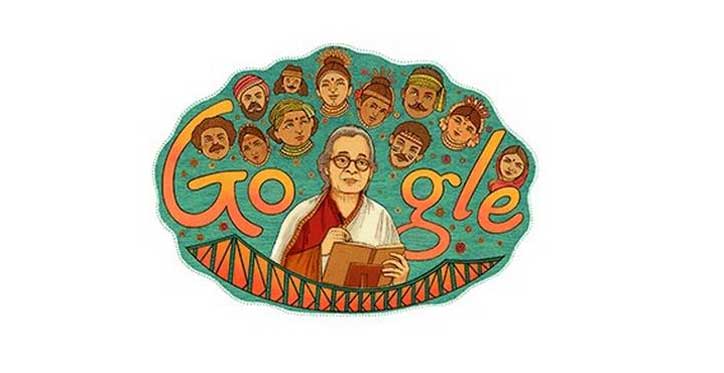 New Delhi:
New Delhi: Tech giant Google on Sunday celebrated the 92nd birthday of eminent Bengali littérateur and social activist Mahasweta Devi with a doodle that depicts the writer’s love for literature, and her crusade for the rights of rural and tribal people.
Hailing from a family of prolific playwrights and writers, Mahasweta Devi wielded the power of the pen to bring to light the plight of “suffering spectators” in our fast-developing country. Writing came naturally to her. Her father Manish Ghatak was an eminent poet and novelist, as was her mother. Her father’s brother Ritwik Ghatak was considered one of the finest directors in Bengal and her husband Bijon Bhattacharya was a prominent left-wing playwright and actor. Having grown up partly in Rabindranath Tagore's Santiniketan, Mahasweta Devi went on to work as an English lecturer at a Kolkata university until 1984 when she retired to concentrate on her writing.
Her first book, Jhansir Rani was a biography of the Rani of Jhansi. Following its publication 1956, she went on to write over 100 books and twenty collections of short stories. Her early works include Amrita Sanchay and Andhanmalik, both set in the British colonial period. Later in the 1970s, influenced by the Naxalite movement, she wrote Hajar Churashir Ma, Aranyer Adhikar and NairhiteMegh, among others.
A long time champion for the political, social and economic rights of the tribal communities, Mahasweta Devi has said that the reason why she writes has evolved over the years. First it was primarily for the money, then to document change and later, to share what she has seen. “I want to reach as many people as possible,” she said. “I write for the masses.”
In her tribute to the writer following her demise, Antara Dev Sen wrote about how Mahasweta Devi’s books often mirror the society. “When you see women in Argentina protesting restrictions by breastfeeding in public, you remember Mahasweta’s Gangor, the young tribal mother who was horribly tormented by the police because someone took a photo of her breastfeeding her baby and published it,” she wrote. “When you hear of Odisha’s Dongria Kondh tribe’s historic victory against Vedanta, the powerful multinational corporation intent on mining in the land where the tribal gods reside in the form of forests and hills, you remember the little people in Shishu (Children), the neglected ones whose beliefs are trampled upon, who are forced out of their own land by mining projects and made into criminals by the greed of the mainstream.”
A writer-activist through and through, Mahasweta Devi had been awarded numerous accolades, including the Padma Vibhushan, the Jnanpith, Magsaysay, Padma Shri and Sahitya Akademi, among others. Her work has been translated into multiple languages. She passed away on July 28, 2016, at the age of 90, in Kolkata, West Bengal.
 New Delhi: Tech giant Google on Sunday celebrated the 92nd birthday of eminent Bengali littérateur and social activist Mahasweta Devi with a doodle that depicts the writer’s love for literature, and her crusade for the rights of rural and tribal people.
New Delhi: Tech giant Google on Sunday celebrated the 92nd birthday of eminent Bengali littérateur and social activist Mahasweta Devi with a doodle that depicts the writer’s love for literature, and her crusade for the rights of rural and tribal people.